Have you ever looked around your house—or your office—and thought, “Life would be so much easier if only I could get organized”? At one time or another, most of us probably have, which is where Calahan Solutions President Stephanie L. H. Calahan comes in. “Professional organizing is a field that’s been around for more than 20 years; however, until recently, only individuals who lived in larger metropolitan areas could find an organizer. Calahan Solutions, Inc. has shown people how to reduce stress through organization since 2002. Life is more complex than ever; people are overwhelmed at work and at home. People are looking for solutions to their challenges, and we’re here to help. Everyone has a set of natural talents, and organization is one of mine. I understand many individuals find it difficult to be organized, and that’s exactly why I founded Calahan Solutions,” she said.
BEFORE & AFTER: Laundry Room
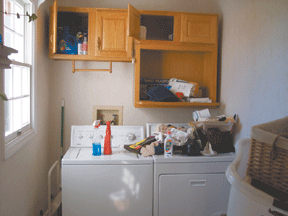
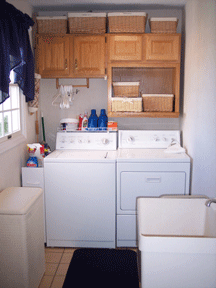
After graduating with a double major in management information systems and human resource management, the central Illinois native worked for various companies, including Hewitt Associates in the Chicago area. “I had read that the most successful people work in an industry they love, where the work doesn’t really feel like work,” Calahan said. “While at Hewitt, I found my most enjoyable projects were ones that involved some form of organizing—be it data/knowledge management or coaching my staff on how to be more effective with their time.”
She said 45 percent of Calahan Solutions customers are business, with 55 percent being residential. “Often, we find that even though our clients have hired us to work in one discipline, they’re using the techniques they learn in other areas of their life. A lot of what we teach and consult on is skills based, so it easily can be transferred.”
Calahan’s Bloomington-based company charges by the hour, rather than the job. “Our clients set the pace; however fast they want to go is what we’ll do,” she said. “Organizing is often an emotional process, and some people need more time than others. Our job is to ensure they make it to their end goal with the support they need. Most of our clients are surprised at how much money they save after working with an organizer.”
Many of us may not see a messy desk as cause for concern at work, but Calahan suggested looking at it from another angle. “Your business is where you likely spend 33 percent of your daily time. It’s in this environment that you probably generate 100 percent of your income. The average person spends more than 150 hours per year just looking for information. If your business isn’t optimally organized, it’s costing you money. If you’ve looked for something for five minutes, how much money have you lost? How many times have you looked for something and it took more than 30 seconds to find? Besides losing money, what could you have accomplished with that time?”
Calahan said each organization project she undertakes is a customized service. “Each appointment is different because each individual is different and has different needs, learning styles, and communication styles. In general, an appointment has three main phases. In analysis/consulting, we walk around and talk about what’s going on. Between the two (or three) of us, we map out a plan to get them from where they are to where they want to be. During physical organizing, we begin organizing based on the plan we created. Usually, that means we begin sorting and purging. You can’t organize until you have a solid understanding of the physical items that need organizing and their purpose/use. During review, we review what we’ve accomplished during the session and the skills that have been taught.”
BEFORE & AFTER: Craft Room
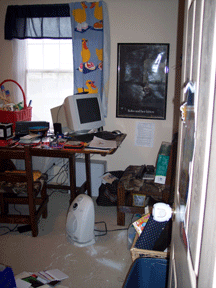
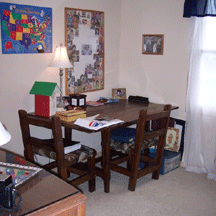
The company also is flexible when it comes to the amount of support provided through each step. “Our involvement can be as much or as little as the client prefers,” she said. “Some of our clients prefer to have us come in and solely consult. We provide to-do lists, and they do the physical organizing on their own. Some of our clients prefer that we help them with both the organization plan as well as the physical organizing. Many of them say they know they won’t do anything unless we’re there to support them. We also have clients who fall in between the two service levels described above. Maybe they feel they can use the closet organizing techniques we’ve described for them, but they’d like us to help them go through all of their paperwork and develop a filing system that will work for them.”
Calahan said the level of organization is also an individual decision. “Some of our clients have had us come in for one room only, while we’ve worked with other clients for more than a year. Different people have different definitions of what ‘organized’ is, so the time it takes to complete a seemingly identical project could be very different for two different clients. Many of our prospective clients ask us how long it will take to get their organizing project completed. We remind them that organizing is a process; it’s frequently not a one-day project.”
She tells clients to ask themselves the following questions:
• How large is the area to be organized?
• How deeply do I want to organize this area? Just get the junk off the floor? Create systems to keep the order in place? A fancy and visually beautiful filing system?
• Am I willing to work on the project in between sessions, or do I find I focus better with the consultant’s support and presence?
• How long did it take me to get this way?
• How emotionally attached am I to what needs to be organized?
• Am I willing to change?
• Have I been disorganized all my life, a short time, or since a major life event?
• Am I willing to schedule “tune-up” appointments to keep positive momentum flowing?
BEFORE & AFTER: Desk
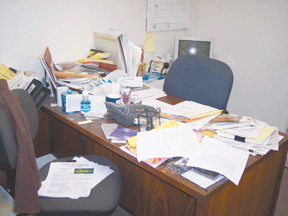
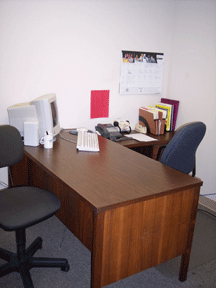
While some people think of hiring a professional organizer as a luxury, Calahan said it actually can have a very large impact on a client’s life. “An organizer helps you establish priorities that make it easier for you to decide whether to keep something or let it go. An organizer teaches you both short-term and long-term techniques for maintaining your new system and ways to prevent clutter from building up again. An organizer can pin down what you need, saving time. There’s no accountability with a book, and there’s no appointment set. Clients often tell me that knowing we care and knowing we’re showing up for a session makes it happen for them. We help you reclaim control of your surroundings, gain space in your home or office, and save money.”
She said there are a variety of reasons clients seek the help of a professional organizer, but these services seem to be a universal need. “According to the National Association of Professional Organizers, 83 percent of Americans say getting more organized is among their goals, and 78 percent of adults say they wish they had more time to stop and smell the roses. It’s reported that women feel more strongly about this than men.”
Calahan said people of all ages, genders, ethnicities, backgrounds, and professions hire professional organizers—and it’s not always because they’ve hit rock bottom in terms of disorganization. “In fact, many of them have neat spaces, but the systems they have in place aren’t working for them. One of the major rules in getting organized is to make your systems fit your life. If an individual developed a system just because it worked great for her boss or spouse, it doesn’t necessarily mean the same system will work for her. According to the National Association of Professional Organizers, the average American woman spends 55 minutes per day looking for things.”
Sometimes emotions prevent people from organizing on their own, she said. “For those who do have a space that’s fuller than the current containers can handle, it’s said that clutter represents unmade decisions. We take this one step farther and offer that in some situations, it may also represent non-confronted or unfinished emotions—usually grief. When you’re still grieving, it’s difficult to let go of an item that represents in material form a connection to a past event or a loved one. When the clutter becomes more painful than the holding on, people usually ask for help.”
Calahan said she and her colleagues don’t see it as their job to convince anyone to get rid of anything. “At the same time, many of our clients have remarked that it’s much easier to let things go when we’re there working with them. The magic of what we do is that for some reason, having an impartial witness affords people a new sense of freedom to lighten their load. People have told us they actually feel as though they’ve lost weight when we’re finished. The main reason we work side-by-side with our clients is that we often come across things that may not seem significant on the surface but hold great sentimental value. In these cases, we accommodate the article in the system we’re creating so it no longer feels like clutter.”
BEFORE & AFTER: Office
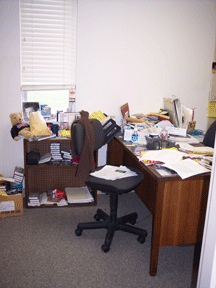
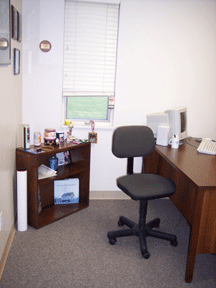
Calahan said you could use the services of a professional organizer if:
• You use your spare bedroom as a junk room.
• The job of getting yourself organized has become so big now that you don’t know where to start.
• Your living space, bookshelves, and bedrooms are so crowded it’s almost impossible to find what you’re looking for.
• You’re convinced you were born without the “organizing gene.”
• You’re embarrassed about all the clutter and avoid entertaining at home.
• You’re running a successful business, but your office needs an overhaul to be more efficient.
• You feel guilty about always working overtime and missing out on family time.
• You’re paying for storage that was meant to be temporary, and it’s now more than one year later.
• You’re positive you have one of “those” somewhere, but you buy another because you can’t find it.
• You begin projects but never complete them.
• Your household filing system is in such disarray that your bills are unpaid and your invitations unanswered.
• You feel overwhelmed by all the stuff that needs doing and long for an attractive, well-organized, and efficient environment.
• Your partner is annoyed at your clutter encroaching on his or her space.
• You’re surrounded by papers in piles, boxes, or bags.
• Everyone in your house trips on kids’ toys or unfinished laundry.
Calahan said many of her clients are surprised that the process wasn’t as painful as they had anticipated and that they actually had a good time. “They also feel empowered to do more because they have the skills to be successful.”
The rave reviews from happy clients are certainly a testimony to how de-cluttering can change your life. One of Calahan’s clients commented, “I was frankly not in the mood to do this project this particular day. She did a great job of keeping me motivated and keeping me on task. I now look forward to coming into work; of course, now I want her to come over to my house.”
Another client told her, “I want to tell you, you inspired me. You came in and listened to my concerns and came up with solutions that were workable for me. I’m amazed at how creative you are and how you can see uses for space that I couldn’t.”
But does Calahan practice what she preaches? Of course. “Organizing is about making time and room for what’s important to you. My systems have had to be altered over time with life changes and with new homes, but overall we do well. As a result, I have plenty of time for my favorite pastimes: spending time with family and friends, reading, singing, and taking photos for my son’s scrapbook,” she said.
Her biggest problem has been altering her organization style to match her husband’s style, she said. “We’re polar opposites in almost every sense; it’s no different when it comes to organizing. My personal organizational style is that of an ‘innie,’ and he’s an ‘outtie.’ An ‘innie’ is someone who functions better and can think clearer when everything is behind closed doors and the space is clear of clutter. An ‘outtie’ is someone who would hold to the adage, ‘out of sight, out of mind.’ They need to see it to know it exists or take action on it. We’ve had to do a lot of compromising over the years. Because of that, our home is set up with various tolerance levels. We looked at our space and determined what areas we each spent more time in and then developed systems accordingly.”
Even Calahan’s son has been trained in organization. “When we had our son, we had to modify again because kids come with a lot of stuff. I’ve worked with David to teach him organization skills at a very early age, and I’m happy to say that by two he was consistently picking up after himself and by three he was participating equally in our bi-annual purging of toys and clothes.”
She said the best part of her career is the positive difference her company can make in someone’s life. The most difficult challenge, however, is keeping track of the vast amount of information she needs to know to provide top-notch service. “Professional organizers are frequently participating in continuing education to learn more about disorders and diseases that lead to chronic disorganization, organizing products, and consulting techniques.”
For more information, visit www.calahansolutions.com. TPW
Click here for more organization tips for home and office.
